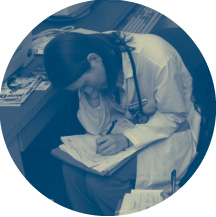Losing sleep over patient safety

What physician doesn’t remember the long hours of residency training with little time for rest?
At the back of everyone’s mind—from residents and supervising physicians to medical school and hospital administrators—is the worry that lack of sleep may jeopardize patient safety.
Emory chancellor Michael M.E. Johns weighed the topic carefully as committee chair for an Institute of Medicine report, Resident Duty Hours: Enhancing Sleep, Supervision, and Safety. Issued late last year, the report proposes revising residents’ duty hours and workloads to decrease the chances of fatigue-related medical errors and enhance their learning experience.
The report does not seek to reduce residents’ work hours from the maximum average of 80 per week set by the Accreditation Council for Graduate Medical Education (ACGME) in 2003. Instead, the report recommends reducing the maximum number of hours worked without sleep to 16, increasing the number of days off, and restricting moonlighting.
Altering residents’ work hours alone, however, is not a silver bullet for ensuring patient safety, IOM committee members stressed. They also called for greater supervision of residents by physicians, limits on patient caseloads based on residents’ levels of experience and specialty, and schedule overlap during shift changes to reduce the chances for error during patient hand-over from one doctor to another.
The report cites financial costs and an insufficent health care work force as major barriers to further revising resident work hours. It also calls for additional funding to teaching hospitals, estimating that additional costs associated with shifting some work from residents to other health care personnel or additional residents could total $1.7 billion per year. The ACGME will review the IOM’s recommendations over the next several months.


